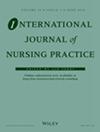The Effect of Inclusive Leadership on Nurses' Taking Charge Behaviour: The Mediating Role of Psychological Security and the Moderating Role of Power Distance
Abstract
Aim
To explore the influence of inclusive leadership on nurses' taking charge behaviour by examining the mediating role of psychological security and the moderating role of power distance, and to provide a reference for nursing management practice.
Background
Nursing is facing a stage of high-quality development, where improvements in nurses' taking charge behaviour can enhance the quality of nursing care, ensuring nursing safety. Inclusive leadership has been shown to promote the maintenance and formation of a dynamic and harmonious two-channel relationship system. However, there are relatively few studies on the effects of inclusive leadership on nurses' taking charge behaviour, and it is unclear whether inclusive leadership affects nurses' taking charge behaviour and the specific pathways of its effects, which are worth exploring in depth.
Methods
A cross-sectional questionnaire survey was conducted among 532 nurses in five tertiary-level A public hospitals in Sichuan Province, China. Structural equation models and bootstrapping methods were utilized to examine the hypotheses. STROBE reporting guidelines were followed.
Results
Inclusive leadership positively influences nurses' taking charge behaviour (β = 0.46, p < 0.001). Inclusive leadership positively affects nurses' psychological security (β = 0.63, p < 0.001). Psychological security positively affects nurses' taking charge behaviour (β = 0.36, p < 0.001). The mediating effect value of psychological security between inclusive leadership and nurses' taking charge behaviour was 0.23, p < 0.001, 95% CI[0.14, 0.32]. The interaction effect of inclusive leadership and power distance reached statistical significance (β = −0.10, p < 0.05).
Conclusions
Inclusive leadership has a positive effect on increasing nurses' taking charge behaviour. Strengthening nurses' psychological security and minimizing nurses' power distance can foster nurses' proactive change behaviours.

 求助内容:
求助内容: 应助结果提醒方式:
应助结果提醒方式:


